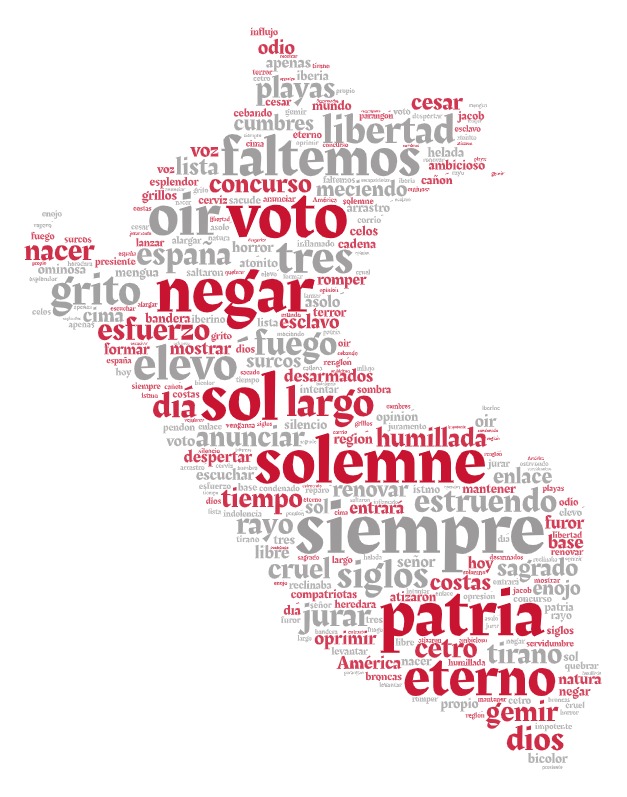
Length: 486 words
Anthem lyrics (use the arrow on the left to collapse this section):
Somos libres, seámoslo siempre
y antes niegue sus luces el Sol,
que faltemos al voto solemne
que la Patria al Eterno elevó.
Largo tiempo el peruano oprimido
La ominosa cadena arrastró;
Condenado a una cruel servidumbre
largo tiempo en silencio gimió.
Mas apenas el grito sagrado
¡Libertad! en sus costas se oyó,
la indolencia de esclavo sacude,
la humillada cerviz levantó.
Somos libres, seámoslo siempre
y antes niegue sus luces el Sol,
que faltemos al voto solemne
que la Patria al Eterno elevó.
Ya el estruendo de broncas cadenas
que escuchamos tres siglos de horror,
de los libres al grito sagrado
que oyó atónito el mundo, cesó.
Por doquier San Martín inflamado,
Libertad, libertad, pronunció,
y meciendo su base los Andes
lo anunciaron, también a una voz.
Somos libres, seámoslo siempre
y antes niegue sus luces el Sol,
que faltemos al voto solemne
que la Patria al Eterno elevó.
Con su influjo los pueblos despiertan
y cual rayo corrió la opinión;
desde el istmo a las tierras del fuego
desde el fuego a la helada región.
Todos juran romper el enlace
que natura a ambos mundos negó,
Y quebrar ese cetro que España,
reclinaba orgullosa en los dos.
Somos libres, seámoslo siempre
y antes niegue sus luces el Sol,
que faltemos al voto solemne
que la Patria al Eterno elevó.
Lima, cumple su voto solemne
y, severa, su enojo mostró
al tirano impotente lanzando,
que intentaba alargar su opresión.
A su esfuerzo saltaron los grillos
y los surcos que en sí reparó,
le atizaron el odio y venganza
que heredara de su Inca y Señor.
Somos libres, seámoslo siempre
y antes niegue sus luces el Sol,
que faltemos al voto solemne
que la Patria al Eterno elevó.
Compatriotas, no más verla esclava
Si humillada tres siglos gimió,
para siempre jurémosla libre,
manteniendo su propio esplendor.
Nuestros brazos, hasta hoy desarmados,
estén siempre cebando el cañón,
que algún día las playas de Iberia,
sentirán de su estruendo el terror.
Somos libres, seámoslo siempre
y antes niegue sus luces el Sol,
que faltemos al voto solemne
que la Patria al Eterno elevó.
Excitemos los celos de España
Pues presiente con mengua y furor
Que en concurso de grandes naciones
Nuestra patria entrará en parangón.
En la lista que de éstas se forme
Llenaremos primero el renglón,
Que el tirano ambicioso Iberino,
Que la América toda asoló.
Somos libres, seámoslo siempre
y antes niegue sus luces el Sol,
que faltemos al voto solemne
que la Patria al Eterno elevó.
En su cima los Andes sostengan
la bandera o pendón bicolor,
que a los siglos anuncie el esfuerzo
que ser libres, por siempre nos dio.
A su sombra vivamos tranquilos,
y al nacer por sus cumbres el Sol,
renovemos el gran juramento
que rendimos al Dios de Jacob.
Somos libres, seámoslo siempre
y antes niegue sus luces el Sol,
que faltemos al voto solemne
que la Patria al Eterno elevó.
Historical context:
The Peruvian national anthem has a long and storied history dating back to Peru’s independence in 1821, when the song was first written and made official. This makes it the second-oldest anthem of a present-day nation in the Americas, predated only by Argentina’s (adopted in 1813).It also represents an excellent example of how both popular and elite influences can shape an anthem over time. Peruvian politician and writer José de la Torre Ugarte y Alarcón, a signatory to Peru’s Declaration of Independence, wrote its original lyrics.
Over time, however, the Peruvian people added an initial verse to the song whose author is unknown, which became the verse commonly sung at events:
Largo tiempo el peruano oprimido
La ominosa cadena arrastró;
Condenado a una cruel servidumbre
largo tiempo en silencio gimió.
Mas apenas el grito sagrado
¡Libertad! en sus costas se oyó,
la indolencia de esclavo sacude,
la humillada cerviz levantó.
(English translation)
For a long time the Peruvian, oppressed
the ominous chain he dragged;
Condemned to a cruel servitude
for a long time he quietly groaned.
But as soon as the sacred cry
Freedom! on its coasts was heard,
He shook off his slavish indolence
and raised up his humiliated head.
Peruvians also began, for reasons unknown, omitting one of the original verses. So when a 1913 law established rules for the presentation of the anthem, the lyrics it listed reflected this popular understanding — deleting a verse of Ugarte’s verses and adding a crowdsourced substitute.
This issue came to a head in 2004, when a Peruvian challenged the 1913 law in court. The plaintiff claimed that the law was unconstitutional because it included some words that were not Ugarte’s, and excluded others that he had written. The Peruvian Constitutional Court ruled on the case the following year, agreeing in part. It recognized the truth of the alleged facts—the 1913 lyrics were not faithful to the original—but only provided the plaintiff with part of what he asked. It ordered that the deleted verse be restored to the song, but kept the anonymously authored first verse, due to its importance to Peruvian cultural patrimony and its widespread societal acceptance. As a result, the song now contains seven verses, along with the chorus.
In 2009, however, the sitting government declared that the verse of the anthem to be sung at events would no longer be the well-known, “crowdsourced” first verse, but rather the lesser-known sixth stanza. According to that administration, the first verse’s lyrics, which refer to the “servitude” of Peruvians pre-independence, were too depressing and damaging to national pride. The replacement, however, was so little known that the government had to launch a nationwide re-education campaign.
Performance:
***NB: This version omits the fifth verse, which the Peruvian Supreme Court decreed officially part of the song in 2004, despite being the work of an anonymous author. Unfortunately, a version on YouTube in which someone sings all seven verses could not be found.***